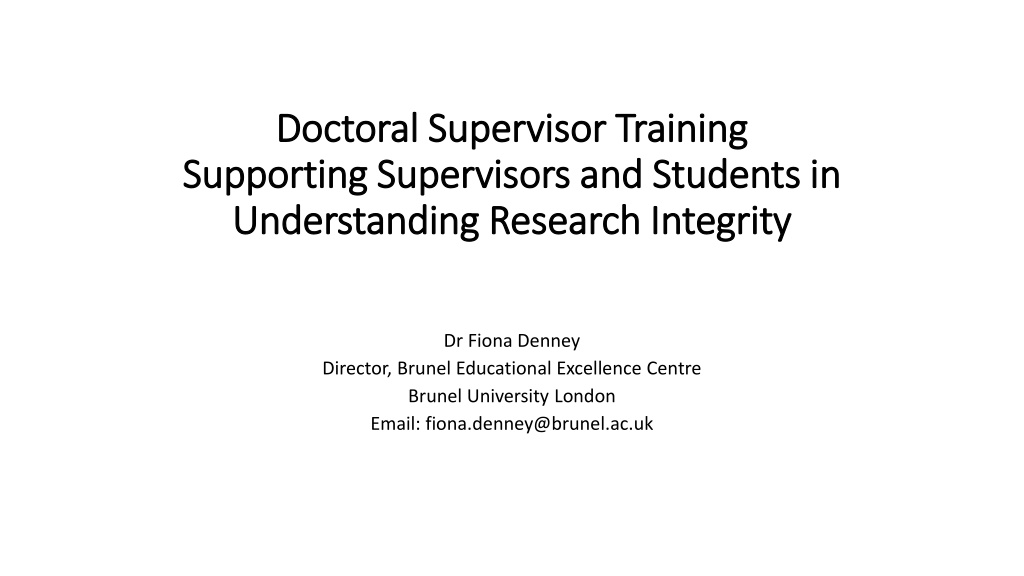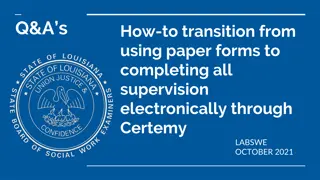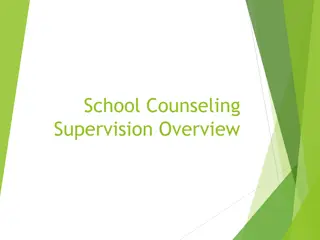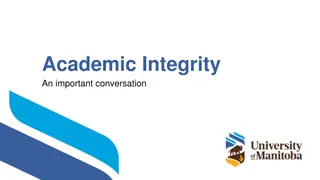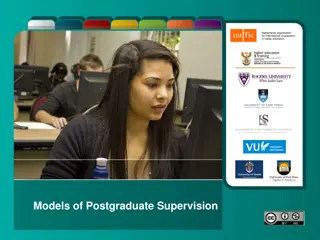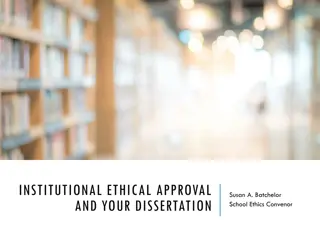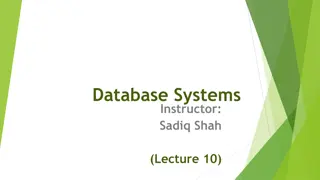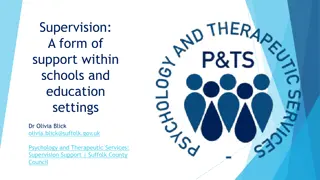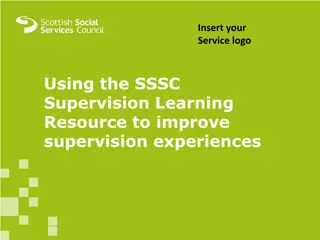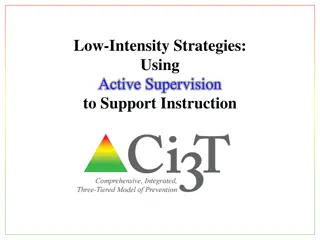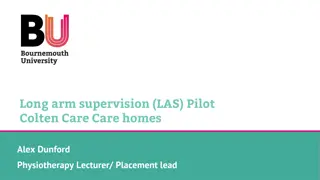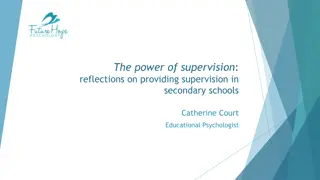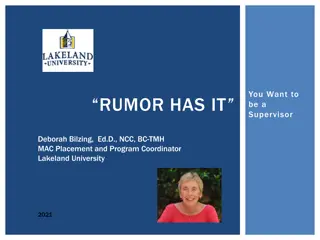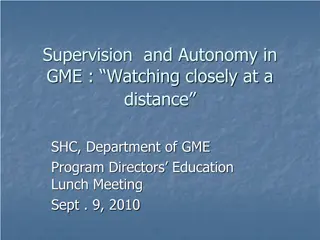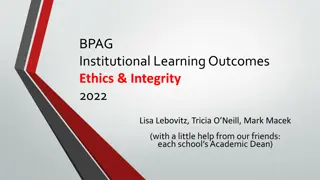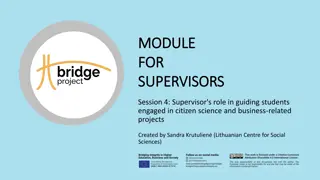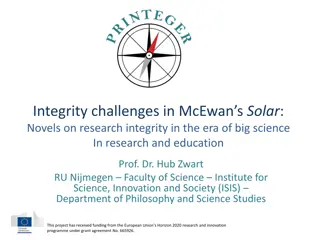Ethical Challenges in Academic Supervision: Addressing Research Integrity and Student Support
Addressing ethical challenges in academic supervision, this content delves into scenarios involving renowned academics, former research colleagues, self-funded students, and delayed PhD projects. Issues of research integrity, respect, and communication are examined, highlighting important considerations for effective supervision practices.
Download Presentation

Please find below an Image/Link to download the presentation.
The content on the website is provided AS IS for your information and personal use only. It may not be sold, licensed, or shared on other websites without obtaining consent from the author. Download presentation by click this link. If you encounter any issues during the download, it is possible that the publisher has removed the file from their server.
E N D
Presentation Transcript
Doctoral Supervisor Training Doctoral Supervisor Training Supporting Supporting Supervisors and Students in Supervisors and Students in Understanding Understanding Research Integrity Research Integrity Dr Fiona Denney Director, Brunel Educational Excellence Centre Brunel University London Email: fiona.denney@brunel.ac.uk
The university in question likes to encourage the use of well-known "celebrity- academics" to work on fractional, visiting contracts in order to add publicity to certain departments. Occasionally these people are engaged in doctoral supervision usually as the second supervisor. On one occasion recently, one such person was found to have conveyed contempt publicly for the work of their doctoral student in a manner in which the student could have been identified. The university was alerted to the situation and now wants to know whether such "celebrity-academics" are trained in research ethics and integrity and whether they under go doctoral supervisor training in any form. What are some of the issues here? How would you resolve them if it were your university?
Kerry had done her PhD in neuroscience at one university and when it was completed, moved onto a post-doc position at another university in the same city. She believed that she remained on good terms with her former research colleagues and PhD supervisor. Kerry comes across as a personable, likeable and capable woman, able to build good working relationships. Soon after she had started her post-doc, she was involved in preparing a journal article for submission with her former colleagues based on the research done at the first institution during her doctorate. Happy to contribute and with an agreement that she would, of course, be named as one of the authors, Kerry wrote several sections for the paper, but when she asked to see the final draft just prior to submission, her former supervisor refused to let her see it. Is there a problem here? What should Kerry do in this situation?
Gerard is a self-funded, part-time student who works as a research associate on your team. He started his PhD at another university about 3 years ago, changed jobs and institutions a year ago and moved his PhD at the same time. You somewhat reluctantly agreed to supervise him although the PhD is only tangentially related to the work you and your group are doing. Gerard has become highly enthusiastic about your project s focus and his PhD is now seriously delayed and has lacked attention for several months. What choices do you as the supervisor have in this situation? What would be best for you and Gerard to do?
Juan is a full-time, self-funded student from South America, researching in the Humanities. About 15 months into his research project his supervisor suggested that he should put in for his upgrade which he duly did. He submitted a report and was questioned by his supervisory team on the future scope for the project. He was then told that he wouldn t be allowed to upgrade from MPhil to PhD but that the department would be happy for him to stay to finish his MPhil. The news came as a complete shock to Juan and he is confused and bewildered by the outcome particularly as he really wants to obtain his PhD. How could this situation have been better handled? What should they do now?
Jasmine is a full-time, self-funded student from overseas. She has been at the university for 9 months and has been highly motivated and enthusiastic about her PhD. Recently you, as the division s postgraduate co-ordinator, have noticed her coming into the lab late, leaving early and walking around with red eyes as though she s been crying. You speak to her, asking if there are any problems, and get a heart-felt sob story about a neglectful supervisor who yells at his students publicly in the lab. In particular, she mentions that he has yelled at her a number of times and then brought her chocolates and flowers the next day as an apology. She is clearly very distressed by this situation and is confused by his apologetic overtures. She feels that she cannot carry on working with this supervisor and in this lab but is also feeling bewildered and guilty. What would you do in this situation?
ALL of these are research integrity issues! Research integrity is concerned with issues around: Data management Authorship Standards Relationships Good leadership The student-supervisor relationship is at the cornerstone of all of these issues.
Is the key how supervisors view their role? Wright, Murray and Geale (2007) identified 5 roles that supervisors adopt: Quality assurers Supportive guides Research trainers Mentors Knowledge enthusiasts Anne Lee (2008) identified 2 key influences on supervisors own approach to supervision: Their concept of research supervision Their own experience as a student Which led to 5 approaches to supervision being identified
Lees Five Approaches to Supervision Functional project management approach Enculturation student becomes a member of the disciplinary community Critical thinking Emancipation student developing themselves Developing a quality relationship In theory, RI should permeate each of these but in practice are there some areas where ethics dominates, and integrity gets overlooked?
9 Dimensions of Doctoral Supervision as Teaching (Bruce and Stoodley 2013) 1. Promoting the supervisor s research development 2. Imparting academic expertise 3. Upholding academic standards 4. Promoting learning to research 5. Drawing upon student expertise 6. Enabling student development 7. Venturing into unexplored territory 8. Forming productive communities 9. Contributing to society having social impact
Key Questions: How can we get supervisors to conceptualise their role so that RI is up front and central? What roles or styles of supervision do we need to emphasise when training supervisors? What else do we need to take into consideration?
Good Practice in Doctoral Supervisor Training In groups, identify 3 aspects of good practice in doctoral supervisor training from your institutions Review the issues list what suggestions can you make for overcoming these problems with regards to RI training? Feedback and share
References Bruce, C. and Stoodley, I. (2013) Experiencing higher degree research supervision as teaching , Studies in Higher Education, 38(2), pp. 226 241. doi: 10.1080/03075079.2011.576338 Lee, A. (2008) How are doctoral students supervised? Concepts of doctoral research supervision , Studies in Higher Education, 33(3), pp. 267 281. doi: 10.1080/03075070802049202 Wright, A., Murray, J. P. and Geale, P. (2007) A Phenomenographic Study of What It Means to Supervise Doctoral Students. , Academy of Management Learning & Education, 6(4), pp. 458 474. doi: 10.5465/amle.2007.27694946
